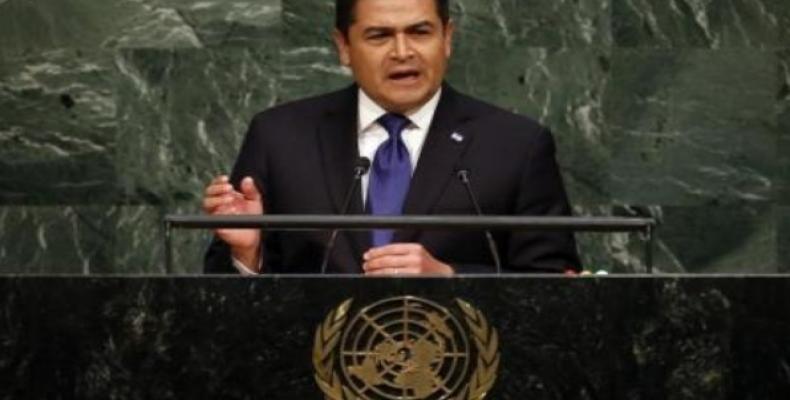New York, September 28 (teleSUR-RHC)-- The United Nations will open a human rights office in Honduras later this year, Honduran President Juan Orlando Hernandez said on Sunday.
According to Hernandez, the office will monitor potential violations carried out by military forces during anti-drug operations.
“Militarizing the country helped to stop a bloodshed related to drug-trafficking,” Hernandez claimed, denying allegations that his state-policy of “putting one soldier in every street corner” led to a considerable increase of human rights violations.
The Honduran president says the homicide rate has dropped from 86 for every 100,000 inhabitants to 55 in the past two years. “What I can affirm is that the police force we used to have – the civilian police – committed many more crimes, and impunity was more frequent.”
Nevertheless, U.N. General Secretary Ban Ki-moon confirmed his desire to set up a Honduran human rights office by the end of the year, Hernandez said during his speech at the U.N. General Assembly. “I wish to emphasize that this was on our request,” he said.
Hernandez´s administration has been repeatedly criticized in the past for limiting human rights activists from reporting about violations in the country.
The Honduran leader also mentioned the humanitarian crisis forcing thousands of Central Americans to flee to Mexico and the United States, admitting a “shared responsibility” between his government and that of the United States, which has not properly the issue of drug-consumption that leads to violence in the region.
Violations of human rights in Honduras have skyrocketed since the 2009 coup d'etat against Manuel Zelaya, according to numerous human rights reports. Militarization spiked in the name of increasing security and cracking down on violence in the Central American country, which has been dubbed the murder capital of the world.
One of the Honduran government's security strategies has been the creation of a controversial hybrid military police force. Launched in 2013 with some 900 personnel who patrol city streets with military equipment, Honduras' military police received widespread condemnation from human rights groups.
Honduran soldiers were accused of at least nine murders, over 20 incidents of torture, and some 30 illegal detentions between 2012 and 2014, according to numbers compiled by Reuters.
The military police force is set to expand by 40 percent this year, and President Hernandez – who is facing calls for his resignation over government corruption allegations – has increased the country's defense budget by 20 percent.
While the U.N. has urged Honduras to put a time limit on the military's security activities, the United States has said it respects the government's move to use soldiers for police functions. However, a group of U.S. lawmakers have demanded the suspension of military aid to Honduras.


